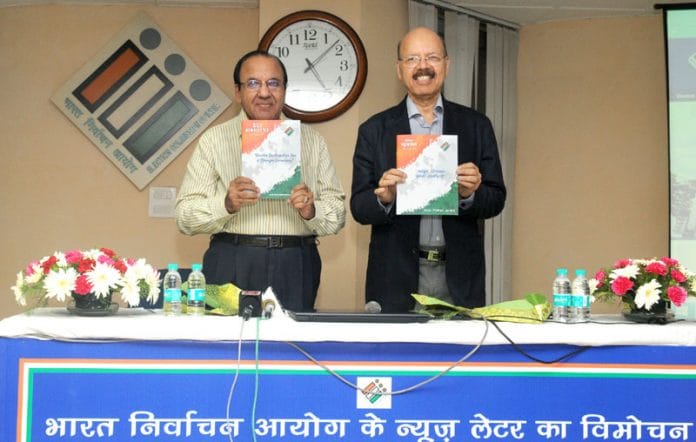Election Commission has begun work to change a range of poll laws to make them relevant to political landscape, check abuse of money power and ensure level playing field.
As Achal Kumar Joti takes charge as the new Chief Election Commissioner of India Thursday, one of the key items on his agenda will be a comprehensive overhaul of the country’s electoral laws and rules – an exercise the Election Commission of India has already begun.
Highly placed sources in the commission told ThePrint that plans are afoot to overhaul the entire gamut of electoral laws and rules to make them relevant to the current political landscape. And checking abuse of money power and ensuring a level playing field to all political parties will be the focus of these changes, besides bringing in clauses to prevent electoral malpractice.
The exercise also aims to weed out outdated provisions and strengthen the legal system to ensure a fair and clean election and better election management. The EC move, ThePrint has learnt, was initiated under the watch of outgoing CEC Nasim Zaidi and early discussions have started.
The commission has already compiled a first draft of the proposal for a legal overhaul and is planning to take these to the law ministry for approval within the next three months.
While the EC has proposed some 50 electoral reforms to the law ministry which are pending approval, it is now initiating a much more comprehensive exercise to tighten laws and make them relevant to the current political landscape.
The Representation of the People Act, 1951, the Government of National Capital Territory of Delhi Act, 1991, Conduct of Election Rules, 1951, besides the Indian Penal Code are being closely studied by the EC for the exercise.
Zaidi had told ThePrint in an interview last week that while the EC had made a number of recommendations to the government towards electoral reforms, some seven or eight proposals were key to ensuring fair and free elections and were still pending government approval.
These, he said, pertained to transparency of political finance and strong deterrent action against corrupt practices. He had identified the need to make bribery a cognisable offence, declare paid news an offence and the need for powers to countermand elections in case of widespread bribery.
The outgoing CEC had also pointed out that the phenomenon of paid news is clearly on the rise and hundreds of cases had come to its notice. Many of the reforms proposed by the EC such as making bribery a cognisable offence have not moved forward due to a lack of political consensus.
The issue of transparency in political funding has also come under a cloud with the EC raising doubts about the Modi government’s plans to issue electoral bonds.







I wish to bring to the notice of the new CEC the apprehension I have of the EVM-VVPAT system ordered by the highest court of the land.
With reference to the modified EVM system where a paper trail is sought to be provided I have the following observations to make.
1. The EVM prints out a paper copy of the elector’s vote and drops it automatically into a ballot box attached to the printer.
2. In the event of any dispute between the candidates the paper ballots can be recounted.
This poses several problems which include
1. A close result will more often than not be questioned by the losing candidate and paper ballot recounts will be ordered and this defeats the very purpose of using EVMs.
2. Under no sane system can there be two recordings of the same vote. I daresay it may be ultra vires the law.
3. If there is a dispute and the paper ballots are recounted and there is a difference between the votes counted in the paper ballot recount and the original count as given by the EVM, then which count is to be considered for declaration of results?
4. This dual recording of the vote creates more problems than solving the perceived problems.
I feel there is no necessity of having VVPAT which will only complicate things if there is a discrepancy in the votes counted electronically with the one counted with the paper trail.
If at all you want to change the system I suggest the following:
I have a simple solution for the consideration of the ECI and it is as follows:
1. Combine technology with older system of ballot paper.
2. The EVM is to be recalibrated to only issue a ballot paper which automatically drops into the ballot box.
3. The ballot paper printed is to be of a special nature where a hole is punched in the serial number of the candidate to whom the vote is meant for.
4. Since it is mechanical, the ballot papers will be stacked and rendered easy for further handling.
5. Once the voting ends, the process that is followed for manual storage, etc., will be followed.
6. Now, technology takes over and counting machines programmed to count the
ballot papers very fast and accurately will do the counting and results can be announced quickly.
7. If there is a dispute, manual counting can be undertaken in the presence
of the agents of the candidates and results declared on the basis of such manual counting.
8. This method eliminates dual recording.
9. This method will save paper and is amenable to voters as they have experience in pressing a button to cast their vote. The difference being that the EVM will not record in the electronic form and will print only the paper ballot which the voter can verify that the hole is punched only on the serial number of the candidate for whom he has voted.
I sincerely request the ECI to consider the above suggestion and implement the same, if found feasible.